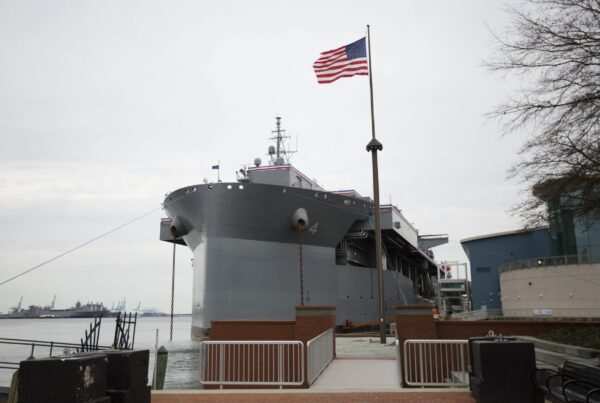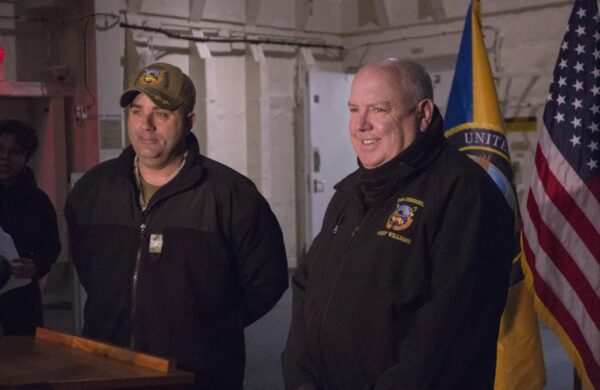The Navy’s fleet of warships will get larger on Saturday.
The Navy will redesignate the expeditionary sea base USNS Hershel “Woody” Williams into the warship USS Hershel “Woody” Williams during a commissioning ceremony in downtown Norfolk.
The slight change in its name means the ship can legally carry out offensive military operations such as allowing Marines or Navy SEALs to launch attacks directly from the ship. A USNS ship under the command of a civilian can engage in combat only if it is defending itself.
The Navy plans to deploy the warship to the Mediterranean Sea and off the coast of West Africa this year. Another expeditionary sea base is on patrol in the Middle East.

The Navy will change the USNS Hershel Williams to USS designation on March 7, 2020, at the Half Moone Cruise Terminal. The ship is named after Marine Corps veteran Chief Warrant Officer Hershel u201cWoodyu201d Williams, of West Virginia, who is renowned for his heroism in the Battle of Iwo Jima during World War II. He is the last living Medal of Honor recipient from the Battle of Iwo Jima.
(L. Todd Spencer/The Virginian-Pilot/TNS)
Capt. David Gray, who will assume command during the commissioning ceremony, said the ship would likely bring Marines on board and primarily focus on airborne mine-countermeasures and supporting special operations during its deployment.
“During those entire times, we could be called up to do any mission possible,” he said.
The Hershel “Woody” Williams is one of five expeditionary sea bases the Navy plans to operate. The 784-foot vessel has a 52,000 square-foot flight deck, fuel and equipment storage, repair spaces, magazines and mission-planning spaces.
It can launch and recover small boats, helicopters and the MV-22 Osprey.
Unlike other warships, expeditionary sea bases operate with a hybrid crew of civilians and military personnel. A civilian crew of 34 operates the ship itself, such as navigation, engineering, food service, electrical, shipboard communications and cranes.
About 100 military personnel on board will conduct security and intelligence functions, operate boats and aircraft, and staff a medical department. Additional military personnel, such as Marines and special operators, can be brought on board to stage operations from the ship, including humanitarian missions like evacuating Americans or delivering relief supplies.

Capt. David Gray, commanding officer, left, and Capt. George McCarthy, civil service ship master, speak during a tour of the USNS Hershel Williams, March 5, 2020. The Navy will change the USNS Hershel Williams to USS designation on March 7, 2020, at the Half Moone Cruise Terminal.
(L. Todd Spencer/The Virginian-Pilot/TNS)
The hybrid makeup of the crew is similar to how the Norfolk-based hospital ship USNS Comfort operates, with the ship itself run by civilian mariners and the medical team consisting of military doctors.
The ship’s civil service master, Capt. George McCarthy, said changing the ship’s designation to a warship doesn’t necessarily put the civilian crew in more inherent risk, and merchant mariners have long been called up to serve the nation in times of war.
“We operate in environments that that pose risk. So, for instance, say we’re in the Arabian Gulf or on the East Coast of Africa with piracy, or, you know, very many other places in the world,” he said. “I think that for the civilian mariners, that’s part of the equation of working here. That’s part of what we do. So whether this particular ship would be more or less risky, I really haven’t formed an option and couldn’t really say that it would be.”
Gray, who will have overall command of the ship and dictate its military operations, said it is his responsibility to not unnecessarily put crew members at risk and he has the support of his chain of command.
“We know what those risks will be, when they’ll be, and who can take those,” he said. “I will call my chain of command and say ‘Sir, ma’am, I need to make sure we have this covered. I don’t feel safe. I don’t think this is correct,’ and they’ll will work it through there. But the majority of the time, the call gets answered. They send the right support to go out there and and make sure the mission stays safe.”
The commissioning ceremony will begin at 10 a.m. Saturday and feature the ship’s namesake, the last living Medal of Honor recipient from the Battle of Iwo Jima during World War II.
Williams was a Marine who volunteered to use a flamethrower to clear “pillboxes,” now known as bunkers, that were protecting Japanese airfields with heavy machine gun fire.
“Covered only by four riflemen, he fought desperately for four hours under terrific enemy small-arms fire and repeatedly returned to his own lines to prepare demolition charges and obtain serviced flame throwers, struggling back, frequently to the rear of hostile emplacements, to wipe out one position after another,” his Medal of Honor citation says.
“On one occasion he daringly mounted a pillbox to insert the nozzle of his flame thrower through the air vent, kill the occupants and silence the gun; on another he grimly charged enemy riflemen who attempted to stop him with bayonets and destroyed them with a burst of flame from his weapon.”
It’s rare to have a ship named after a living person and for that person to speak at the commissioning ceremony. Williams has visited the ship named after him before, and McCarthy said he’ll have an inspiring message for the young crew as they prepare to head to sea.
“When you hear Woody talk and when you hear him speak, it’s a very, very inspirational story,” he said. “He’s very humble. He’s very approachable. … This is a very, very rare opportunity, and I hope folks appreciate that. Living namesake, a member of the Greatest Generation — and with it a fabulous, fabulous story to tell.”
___
© 2020 The Virginian-Pilot
Distributed by Tribune Content Agency, LLC.



